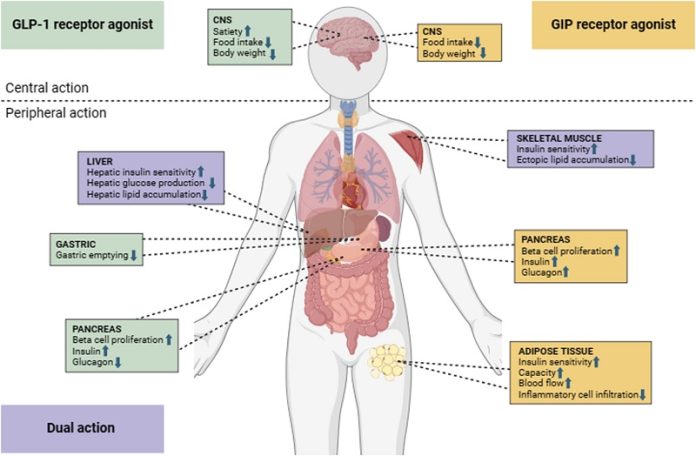
Researchers at the University of Liverpool have discovered that the weight-loss drug tirzepatide could significantly reduce the risk of developing type 2 diabetes (T2D) in people with obesity.
This finding is important, as obesity is a growing global health issue.
Currently, around 650 million adults and 340 million children and adolescents worldwide are living with obesity, which is a major risk factor for developing T2D.
This condition not only increases the risk of other health problems but also contributes to higher rates of illness and death.
The study, published in eClinicalMedicine, analyzed anonymized electronic medical records from a global database to compare the effects of tirzepatide with another weight-loss drug, semaglutide.
The researchers created two groups: one consisting of people without T2D and the other with T2D. Using real-world data, they found that tirzepatide was more effective than semaglutide in reducing the risk of developing T2D in people with obesity. Additionally, in those already diagnosed with T2D, tirzepatide was associated with fewer major cardiovascular events.
Dr. Uazman Alam from the University of Liverpool highlighted the significance of these findings, stating that about one in four adults is living with obesity, which greatly increases the risk of diabetes.
In the UK alone, approximately 4 million people have type 2 diabetes, and managing diabetes complications costs the healthcare system around £6.2 billion each year. He emphasized that the positive results of this study could play a crucial role in addressing this major health challenge.
Dr. Matthew Anson, a clinical research fellow at the University of Liverpool, added that the weight loss achieved with tirzepatide might be a key factor in reducing the risk of developing T2D and lowering cardiovascular complications. However, he noted that more research, particularly randomized controlled trials, is needed to fully understand how tirzepatide could be used to prevent T2D in those at higher risk.
This study offers hope for a new approach to managing and potentially preventing type 2 diabetes, a condition that affects millions worldwide.
If you care about diabetes, please read studies about high vitamin D level linked to lower dementia risk in diabetes, and green tea could help reduce death risk in diabetes.
For more information about nutrition, please see recent studies that blueberries strongly benefit people with metabolic syndrome, and results showing vitamin D could improve blood pressure in people with diabetes.



